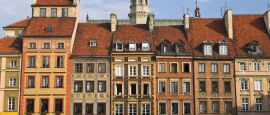Where to stay in Poland
Most major international hotel chains are represented in Poland; the largest local chain is run by Orbis (www.orbis.pl), with more than 60 properties nationwide.
Grading: Hotels in Poland are graded in five categories: Luxury, 4-star, 3-star, 2-star and 1-star. In addition there are tourist hotels, boarding houses and motels, each graded into three or four categories. At the bottom of the heap are sports and workers’ hotels, many of which look they are stuck in a 1960s time warp.
Guest houses, or pensions (pensjonaty) can be rated on a 1- to 3-star rating, but if it hasn't been rated, it doesn't mean it's not good - it might just be very small without a lift or fire door. You’ll often find such bed and breakfasts in the mountains and by the sea. Guest houses can range from very basic bunk houses to cosy or even luxurious accommodation with spas and conference facilities. You can often make reservations through local tourist offices.
There are over about 200 campsites in Poland, nearly 75% of which are fitted with 220-volt power points and several with 24-volt points for caravans. Facilities also include washrooms, canteens and food kiosks. The main camping season is June to August; popular places to camp include the Baltic Sea coast and the Great Masurian Lakes Region. Holders of an international camping card (FICC) qualify for a 10% discount on rates. There are private campsites too, often no more extravagant than a homeowner’s garden but a godsend in oversubscribed areas at the height of the season.
There are over 150 official hostels in Poland that are open all year round, and 450 only in the summer season. They are run by the Polish Youth Hostels Association (www.ptsm.org.pl), a member of Hostelling International (www.hihostels.com). You can find addresses on either site. When in big cities like Warsaw, Cracow or Wrocław, however, there’s no need to stay in official hostels, which can be soulless, rule-obsessed establishments. Instead, head for one of the new breed of independent hostels which are upbeat, friendly, cater to backpackers, always have internet access and sometimes boast an in-house bar or even club.
Agricultural tourism is a more recent business model. The accommodation is usually in farms, country homes and cottages. Some agricultural accommodation (kwatery agroturystyczne) serves organic food harvested on an adjacent farm and promotes outdoor activities, which may involve helping on the farm. Other places only nod to this concept by offering horse riding. In any case it’s a great way to meet local people and see the Polish countryside up close.
Another option is to rent a room in a private home. These are available in cities and at holiday destinations around the country. You can book them through special agencies or directly with the owner – look out for signs reading pokoje (rooms) or noclegi (lodging). The toilet facilities are usually shared, but otherwise you can close your door and enjoy as much privacy as you please.
Do you have any Feedback about this page?
© 2026 Columbus Travel Media Ltd. All rights reserved. No part of this site may be reproduced without our written permission, click here for information on Columbus Content Solutions.




 You know where
You know where